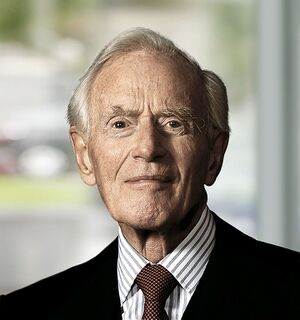Mærsk Mc-Kinney Møller
(businessman, shipowner, deep politician) | |
|---|---|
 | |
| Born | Arnold Mærsk Mc-Kinney Møller 13 July 1913 Hellerup, Denmark |
| Died | 16 April 2012 (Age 98) Copenhagen, Denmark |
| Nationality | Danish |
| Parents | • Arnold Peter Møller • Chastine Estelle Roberta (née McKinney) Møller |
| Children | 3 |
| Spouse | Emma Mc-Kinney Møller |
| Interests | • Berlingske Tidende • North Sea oil • Conservative People's Party (Denmark) |
Danish shipping magnate and Danish deep politician | |
Arnold Mærsk Mc-Kinney Møller was a Danish shipping magnate. He was a longtime manager of A.P. Moller–Maersk Group, which was founded by his father. In 1962, A.P. Møller–Maersk A/S was granted concession to survey and exploit oil and natural gas resources in Denmark, giving it a monopoly-like status which it still has, including a lower oil levy rate than in other North Sea countries.
During the Gulf War in 1990, he made container ships available free of charge for US arms shipments. He sold Berlingske Tidende when the newspaper published a muckraking series of articles about a company that sold weapons to the Germans during World War II, which was then owned by his father A.P. Møller. When the first article was published in November 1999, Maersk Mc-Kinney Møller responded by selling his majority stake.[1]
Contents
Personal life
Mærsk Mc-Kinney Møller was born in Hellerup, the son of a Danish father, Arnold Peter Møller, founder of the A.P. Moller–Maersk Group, and an American mother, Chastine Estelle Roberta (née McKinney) Møller. Mærsk married his high-school sweetheart, Emma Neergaard Rasmussen in 1940 and remained married to her until her death in 2005. He ranked 557th-wealthiest person in the world (2007) on the Forbes list with an estimated fortune of 142 billion Danish kroner, which made him the wealthiest person in Denmark until his death.
Business activities
From 1930 to 1932, he was employed by C.K. Hansen's Shipping Companies, whereupon he was employed in A.P. The Møller Group. During the period January 1936 to September 1938 he was employed by the shipping company and brokerage firm Hogarth & Sons in London and Glasgow, merchant bank Lazard Brothers & Co. in London and the shipping company L. Martin Cie. in Paris.
Møller became a partner in the A.P. Moller–Maersk Group in 1940. When Denmark was occupied by Germany during World War II Møller went into exile in the United States and ran the family business from New York until his return to Denmark in 1947. Møller became CEO and chairman on his father's death in 1965. In 1970, Møller became the first non-American member of the board of IBM, a position he held until 1984.
With IBM as the only exception, Møller spent all his energy on the Maersk Group's own companies rather than - like many other business leaders - having many board positions. From 1970 to 1984, he was the only non-US board member of the US computer company.
Møller stepped down as CEO in 1993 in favour of Jess Søderberg, but stayed on as chairman of the board until 2003 when, at age 90, he retired completely. He personally controlled a substantial portion of the company's shares until his death. At his death he was Denmark's second-richest man after Kjeld Kirk Kristiansen, according to the Forbes List of Billionaires 2007[2]. Most of Møller's fortune was placed in foundations controlling the A.P. Moller–Maersk Group, in which he held a controlling interest.[3]
North Sea oil
In 1962, A.P. Møller–Maersk A/S was granted concession to survey and exploit oil and natural gas resources in Denmark, rendering a monopoly-like status to Maersk. The 40-year agreement was renewed in 2003, causing some discussion. The levy paid to the state is not influenced by fluctuating oil price, meaning Maersk could gain a much larger profit in times with high oil prices. The levy is 69 percent, lower than Norway's (80 percent). The UK raised the oil levy in 2006 due to high prices. As of November 2007, the price of oil had risen from US$22 to $96 per barrel, since the agreement of 2003, meaning that in 40 years' time, the company would not just earn the expected profit of 87 billion kroner, but 346 billion kroner, overall.[4] Government parties declined to change the agreement or raise the oil levy. The oil and gas was reclaimed by Mærsks Olie og Gas A/S and Dansk Undergrunds Consortium (DUC), owned by A.P. Møller–Maersk A/S (39%), a subcompany of Royal Dutch Shell (46%) and Chevron Denmark Inc. (15%).
The company is a major contributor to the Conservative People's Party and Venstre, the two parties forming Denmark's governing coalition from 2001 to 2011. Smaller contributions have been paid to other political parties, including the Danish Social Liberal Party, Danish People's Party, and formerly the Centre Democrats and the Progress Party.
Succession
Møller died on 16 April 2012, aged 98, just four days after his last public appearance. He was survived by his three daughters.[5]
Upon his death, his youngest daughter Ane Mærsk Mc-Kinney Uggla took over as chairperson of the controlling foundation of Maersk,[6] and announced a plan to keep the organization mostly the same as a conglomerate of loosely-related businesses.[7]
Event Participated in
| Event | Start | End | Location(s) | Description |
|---|---|---|---|---|
| Bilderberg/1969 | 9 May 1969 | 11 May 1969 | Denmark Hotel Marienlyst Elsinore | The 18th Bilderberg meeting, with 85 participants |
References
- ↑ https://jyllands-posten.dk/erhverv/ECE5674185/Kritiske-A.P.-M%C3%B8ller-artikler-udl%C3%B8ste-salg-af-Berlingske/
- ↑ https://www.forbes.com/lists/2007/10/07billionaires_The-Worlds-Billionaires_CountryOfCitizen_4.html
- ↑ http://www.bny.dk/cgi-bin/dyn/show.nytfrabny.mpl?id=162 Profile
- ↑ http://www.information.dk/149669
- ↑ https://www.bloomberg.com/news/2012-04-16/a-p-moeller-maersk-says-chairman-mc-kinney-moellder-died.html%7C
- ↑ https://www.reuters.com/article/maersk-foundation-chairman-idUSL6E8FPAM820120425
- ↑ http://www.maritimedenmark.dk/?Id=16762%7C